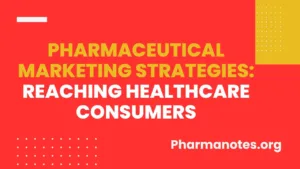Pharmaceutical Marketing Strategies: Reaching Healthcare Consumers

Pharmaceutical Marketing Strategies:
Pharmaceutical marketing plays a crucial role in promoting medications and healthcare products to both healthcare professionals and consumers. With the healthcare landscape constantly evolving, pharmaceutical companies employ various strategies to effectively reach their target audience and drive product adoption. In this article, we explore some of the key pharmaceutical marketing strategies utilized in today’s dynamic market.
1. Understanding the Target Audience
Before developing any marketing strategy, pharmaceutical companies must have a deep understanding of their target audience. This includes healthcare professionals such as physicians, pharmacists, and nurses, as well as consumers/patients. By understanding their needs, preferences, and behaviors, companies can tailor their marketing efforts to resonate with their audience effectively.
2. Multi-channel Marketing
In today’s digital age, multi-channel marketing has become increasingly important for pharmaceutical companies. This approach involves utilizing various channels such as social media, websites, email marketing, mobile apps, and traditional channels like print advertisements and television commercials. By leveraging multiple channels, companies can reach a broader audience and engage with them through their preferred communication channels.
3. Educational Content Marketing
Educational content marketing is another effective strategy employed by pharmaceutical companies to inform and educate both healthcare professionals and consumers about their products. This includes creating informative articles, whitepapers, case studies, and videos that provide valuable insights into the disease state, treatment options, and the benefits of the pharmaceutical products. By providing educational content, companies can establish themselves as trusted authorities in their respective therapeutic areas.
4. Relationship Marketing
Building and maintaining strong relationships with healthcare professionals and consumers is essential for pharmaceutical companies. Relationship marketing involves establishing regular communication, providing personalized support, and offering value-added services to healthcare professionals and patients. This can include providing product samples, offering patient assistance programs, or organizing educational events and webinars.
5. Influencer Marketing
Influencer marketing has emerged as a powerful strategy for pharmaceutical companies to reach and engage with their target audience. By partnering with healthcare professionals, patient advocates, and social media influencers, companies can leverage their credibility and reach to promote their products effectively. Influencers can share their experiences, provide testimonials, and endorse products, helping to build trust and credibility among their followers.
6. Compliance with Regulatory Guidelines
Pharmaceutical marketing must adhere to strict regulatory guidelines and compliance standards to ensure ethical and responsible promotion of healthcare products. Companies must carefully review and follow regulations set forth by governing bodies such as the Food and Drug Administration (FDA) in the United States and similar regulatory agencies in other countries. This includes providing accurate and balanced information, disclosing potential risks and side effects, and avoiding misleading or deceptive claims.
7. Data-driven Marketing
Data-driven marketing involves leveraging data and analytics to inform marketing strategies and decision-making. Pharmaceutical companies can collect and analyze data from various sources, including sales data, patient demographics, and market trends, to identify opportunities and optimize their marketing efforts. By gaining insights into consumer behavior and preferences, companies can personalize their marketing messages and improve targeting effectiveness.
8. Patient-centric Marketing
In recent years, there has been a shift towards patient-centric marketing in the pharmaceutical industry. This approach focuses on understanding the needs and preferences of patients and placing them at the center of marketing strategies. Pharmaceutical companies strive to empower patients by providing them with information, support, and resources to manage their health effectively. This can include patient education materials, adherence support programs, and patient advocacy initiatives.
Conclusion
Pharmaceutical marketing is a dynamic and complex field that requires careful planning, creativity, and compliance with regulatory guidelines. By employing a combination of strategies such as multi-channel marketing, educational content marketing, relationship marketing, and influencer marketing, pharmaceutical companies can effectively reach and engage with their target audience. By prioritizing patient-centricity and compliance with regulatory standards, companies can build trust, drive product adoption, and ultimately improve patient outcomes.
FAQs on Pharmaceutical Marketing Strategies
- What are some common challenges faced by pharmaceutical marketers?
- Pharmaceutical marketers often face challenges such as strict regulatory guidelines, increasing competition, and the need to effectively communicate complex scientific information to diverse audiences.
- How do pharmaceutical companies ensure compliance with regulatory guidelines in their marketing efforts?
- Pharmaceutical companies have dedicated compliance teams responsible for reviewing and approving marketing materials to ensure they adhere to regulatory guidelines and ethical standards.
- What role does data-driven marketing play in pharmaceutical marketing strategies?
- Data-driven marketing enables pharmaceutical companies to analyze market trends, identify target audiences, and personalize marketing messages for maximum effectiveness.
- How do pharmaceutical companies measure the success of their marketing campaigns?
- Pharmaceutical companies use various metrics such as sales data, customer engagement metrics, and brand awareness surveys to measure the success of their marketing campaigns.
- Are there any specific regulations governing pharmaceutical marketing on digital channels?
- Yes, pharmaceutical marketing on digital channels is subject to the same regulatory guidelines as traditional marketing channels, with additional considerations for data privacy and online advertising standards.
Also, Visit:
B. Pharma Notes | B. Pharma Notes | Study material Bachelor of Pharmacy pdf